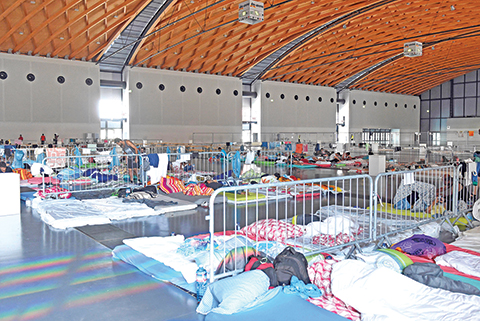 Refugees rest on matressses at a temporary residence for 500 people hosted in a hall at the Fairground of Karlsruhe, western Germany on August 8, 2015. Germany faces a record influx of refugees, with 300,000 asylum seekers registered since January 2015. AFP PHOTO / DPA / ULI DECK +++ GERMANY OUT
Refugees rest on matressses at a temporary residence for 500 people hosted in a hall at the Fairground of Karlsruhe, western Germany on August 8, 2015. Germany faces a record influx of refugees, with 300,000 asylum seekers registered since January 2015. AFP PHOTO / DPA / ULI DECK +++ GERMANY OUT
PALERMO: Their children slipped out of their grasp as the boat overturned and were lost to the waves. Now, traumatised parents brought to safety after a deadly Mediterranean shipwreck are being given psychological support in Sicily. The crossing was supposed to be the start of a new life in Europe, but at the Caritas-run "Saint Rosalia" centre in Palermo, grieving parents plucked from the sea off Libya sit numbly, watching those children that did survive and asking what the future now holds.
Psychologists, cultural mediators, volunteers and members of Doctors Without Borders (MSF) do what they can to comfort the 367 survivors brought to Sicily by the Irish patrol boat which rescued them after Wednesday's disaster. On the patio, two veiled women are hugged in turn by psychologist Anna Cullotta, who has experience in helping migrant survivors. Nearby, three children, still wearing the plastic shoes handed out as they got off the boat on Thursday, play a game of table football with a volunteer.
"Wednesday's shipwreck was the most tragic and poignant of all, because among the recovered bodies and missing people there were numerous children," Cullotta told AFP. A young Syrian mother, who had hoped to join her husband in Sweden with their son, instead saw him drown as the fishing boat went down. "She set off with the idea of a future, full of hope, then the tragedy. She called her husband to tell him the news, and she hasn't spoken since," Cullotta said.
Scenes of violence and fear in the moments leading up to the tragedy were recounted by police Friday, who said survivors had described how the traffickers slashed migrants with knives and thrashed them with belts. Five suspects from Libya, Algeria and Tunisia were arrested after witness said they sealed some 250 desperate passengers in the boat's hull shortly before the accident, giving them no chance of escaping with their lives when the vessel sank.
Pretending Mummy is still alive
The survivors need help to "carry their psychological and emotional burden", Cullotta added. Chiara Montaldo, an MSF coordinator for Sicily, said "they need to speak, to vent", explaining how the aid organisation brought a team of cultural mediators to the centre "who speak the same language as them, who share the same culture".
"The most important thing is that people feel listened to because they are completely disorientated, they have lost their bearings in a country they do not know, so having something which reminds them of their culture, something familiar, is fundamental."
Cullotta said they were suffering a double blow. "Added to the shipwreck is the loss of their children "-and all after the stress and trauma of long, difficult and often dangerous journeys from their homes to departure points in Libya. "We need to be present, close to them, to help them to share their suffering," she said.
With children who have lost their brothers, sisters or parents, the approach is different: "With them, it's about games, we need to distract them. They play, and in doing so protect themselves from something that's bigger than them." If it is possible, they try to get relatives to speak to the children on the telephone. For the small children, a woman may pretend to be their mother, a female voice on the other end of the line often reassuring them. The very youngest are not told their parent has died: "We tell them mummy has gone to work, that she is abroad."
Cullotta says she tells the mothers "that they are superwomen-they have an admirable strength and courage, to be so attached to life and the future. They are certain their lives can get better. "It's a discovery and a lesson for all of us," she said. And such a future is symbolised by one survivor, who lost three children to the Mediterranean-only to discover when she arrived in Italy on Thursday that she is pregnant. - AFP

